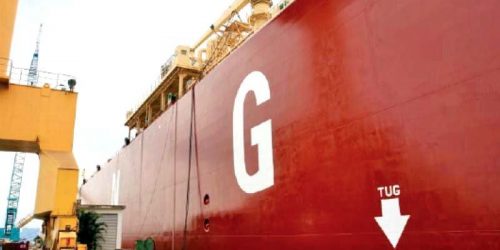With claims of charging 300% higher port charges on liquefied natural gas (LNG) vessels, the Petroleum Division has approached the Cabinet Committee on Energy (CCOE) with a proposal to reduce the charges.
Two state-run energy companies – Pakistan LNG Limited (PLL) and Pakistan State Oil (PSO) – have pointed out that LNG vessels were still facing problems in navigating despite collection of $47.5 million by the Port Qasim Authority (PQA).
The two companies have informed the Petroleum Division that the Channel Development Cess (CDC) was collected for the first 200 LNG carriers for channel widening and dredging.
PQA communicated that it would continue charging the CDC until the complete recovery of its investment cost. However, the investment/ project cost and update on dredging and widening of the channel was not provided by the PQA.
A total of $47.5 million in CDC has been collected to date for infrastructure development at Port Qasim. At present, LNG vessels’ passage in the channel adversely affects the movement of other ships. All traffic in the channel stops when an LNG vessel is moving.
Due to unavailability of night navigation, the charter cost is affected, which is ultimately reflected in the price of LNG.
PQA has been receiving port charges for handling imported LNG vessels which are among the most expensive in the region. The main components of port charges are pilotage, towage and CDC. Pilotage charges are $3.706 per gross registered tonnage (GRT) and CDC is $100,000 per vessel.
Total charges per LNG cargo range from $600,000 to $750,000, which is 300% more than the average of other regional ports. These charges contribute to an increase of approximately Rs7 in the price of LNG.
PQA had charged an amount of $1 million per LNG vessel starting March 2015. PSO is of the view that pilotage and towage are the largest components of PQA’s LNG port charges (initially $600,000 out of total charges of $1 million per vessel).
This pilotage and towage cost was initially determined for a two-year period (March 2015 to February 2017) and later extended for another year till February 2018.
PQA first reduced the towage rate from $5.913 to $4.199 per GRT on February 1, 2017 and then to $3.706 per GRT on June 13, 2018.
However, these reductions were not applied retrospectively from March 2015 with the result that PQA overcharged towage cost in the years 2015-2017. Since the towage rate in USD/GRT is derived from pilotage and towage related expenses for a three-year period (March 2015 to February 2018), any reduction in tariff should be applied to the entire three-year period – both retrospectively and prospectively.
In a summary moved to the CCOE, keeping in view the position reported by PSO and PLL, the Petroleum Division proposed setting the PQA LNG pilotage and towage rate at a comparable level to rates of regional ports, effective from March 2015, and that number should not be more than $2 per GRT.
It further proposed the cabinet body on energy that PQA should utilise the already collected CDC for widening and development of the channel, before collecting additional CDC.
It proposed to carry out an independent evaluation for an optimally competitive GRT rate post-2021 when private terminals are also likely to start.
PSO and PLL are the two state-owned entities which are incorporating LNG in the country through two LNG re-gasification terminals (PGPCL & EETPL), which were established with guarantees of the government of Pakistan.
PSO started importing LNG in March 2015 on the first LNG Terminal (EETPL) at Port Qasim. As of November 29, 2020 a total of 345 LNG cargoes have been imported. PLL also started importing LNG on the second LNG Terminal (PGPCL) in 2017 and a total of 125 LNG cargoes have been imported.





